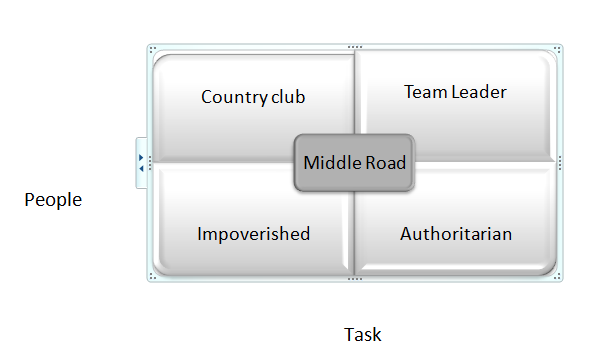Managerial Grid by Blake and Mouton
Managerial Grid introduced by Blake and Mouton (1964) classifies management practices according to the level of managers’ concern for people and concern for production. Specifically, the Managerial Grid specifies four types of managers: impoverished, authority obedience (produce or perish), country club, and team leader.
According to the grid impoverished management characterises a type of management style where the manager has low level of concern for both, employees and task. Impoverished managers with low concern for people and production are the least desired type of managers in terms of achieving organisational objectives.
Cases where managers focus on task with a low level of concern to people would relate to authoritarian management style.
There is also an alternative management style known as a ‘country club’ where manager focuses on the quality of relationships with employees to an extent that the quality of work can be compromised. “This kind of manager would concentrate efforts on the establishment of a pleasant workplace with friendly and comfortable human relations” (Miller, 2011, p.49).
Authority obedience (produce or perish) management prioritises production, but has low concern for employees. In such environments all components of production are achieve maximum input from employees.
With high concern for people, as well as, for production, team leaders are best positioned to achieve organisational objectives in an efficient manner (Mumford, 2009). Moreover, as it can be seen from the figure above, some managers position themselves in ‘middle of the road’ trying to balance various management roles within the Managerial Grid. According to Blake and Mouton managers need to strive for team leader position within the grid so that positive results can be achieved with fewer efforts.
References
Miller, K. (2011) “Organisational Communication: Approaches and Processes” Cengage Learning
Mumford, M.D. (2009) “Leadership 101” Springer Publishing Company
Murphy, D.J. & Willmott, H. (2010) “Organisation Theory and Design” Cengage Learning

